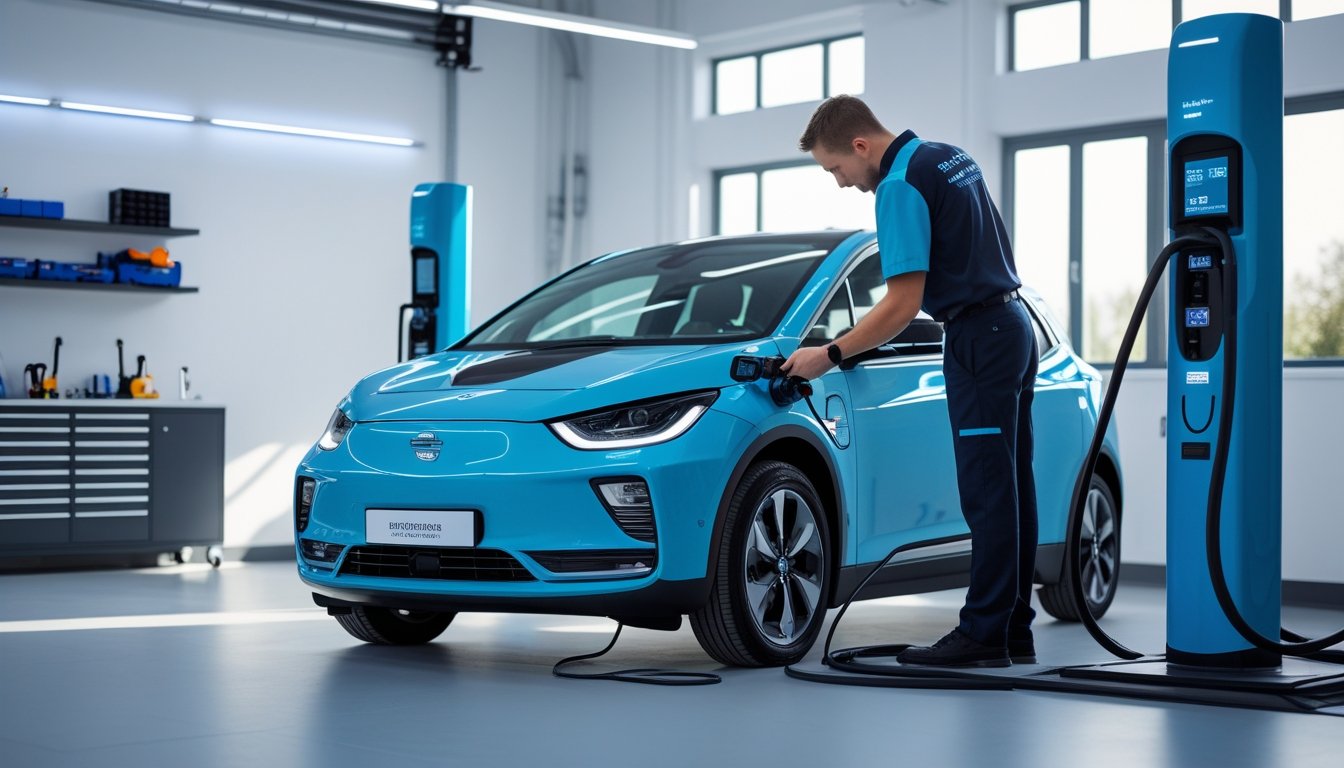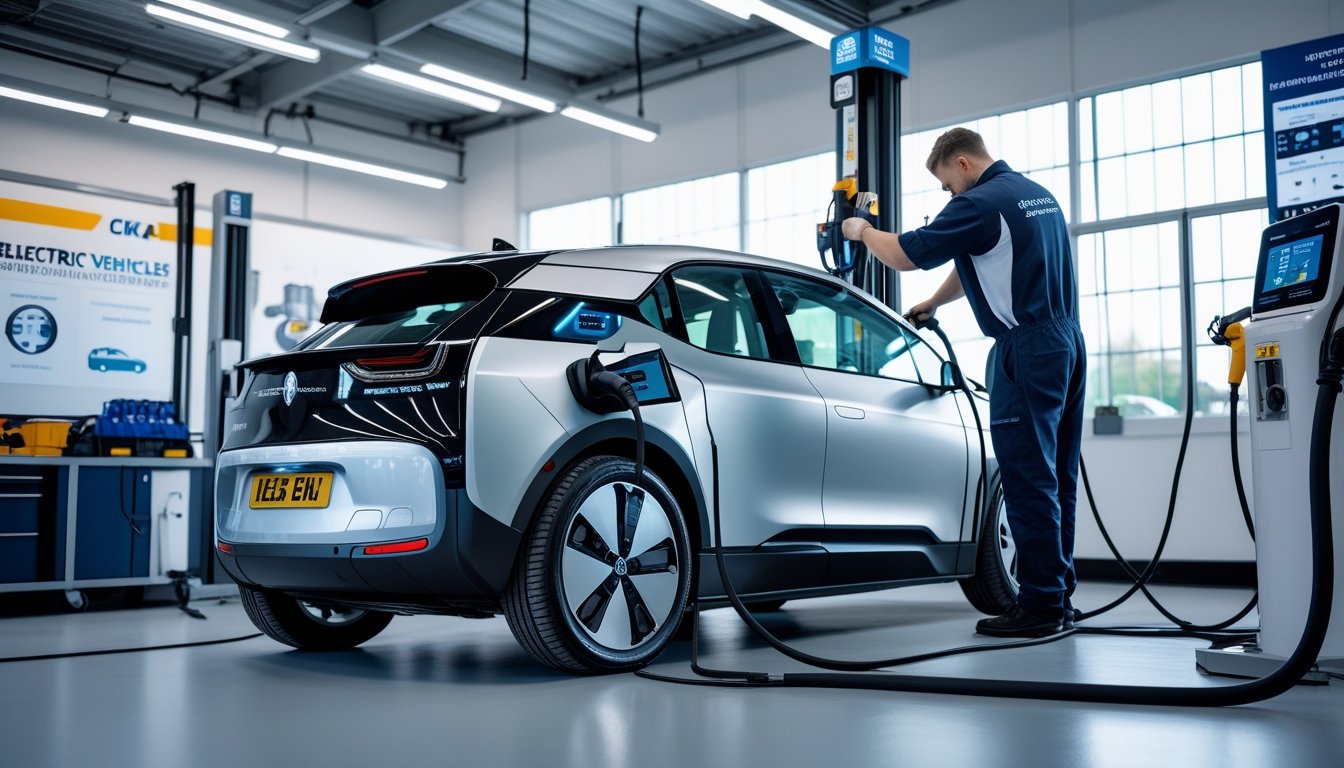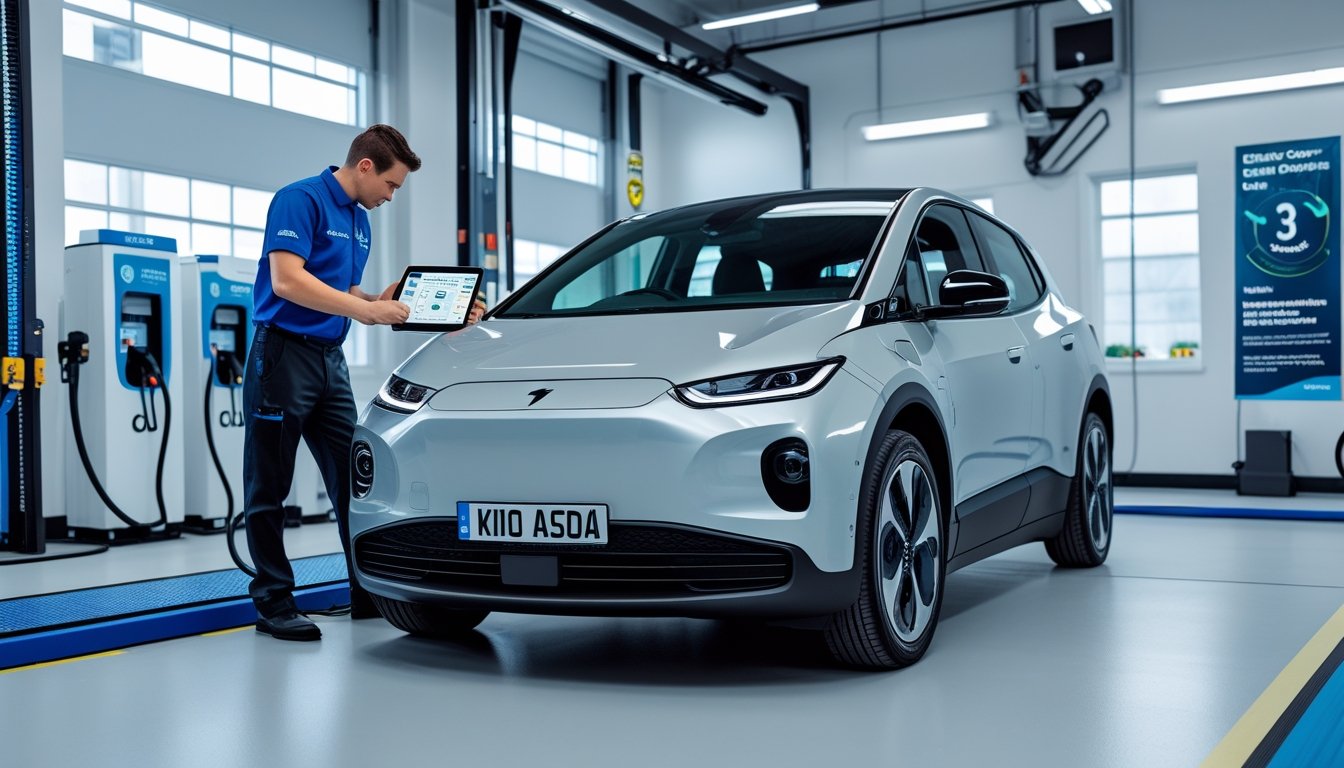Late updated: 12 Aug 2025 14:08
Written by: Amber Collins
Electric Car Maintenance Tips For UK Businesses: A Practical Guide
Electric cars are revolutionising the way UK businesses think about fleet management and sustainability. The shift from traditional petrol and diesel vehicles to electric means a different approach to maintenance. Understanding how to maintain an electric vehicle can significantly reduce your business's operational costs and improve the longevity of your fleet.

Electric vehicles offer unique benefits, such as regenerative braking systems and fewer moving parts, resulting in less wear and tear compared to their petrol and diesel counterparts. Despite these advantages, regular maintenance is essential to ensure optimal performance and reliability. Proper attention to key areas like battery care and tyre pressure not only promotes safety but also maximises efficiency.
By comprehensively addressing these maintenance needs, businesses can make informed choices that benefit both the environment and their bottom line. As we examine these aspects, it's clear that staying informed and proactive in electric car maintenance is critical to reaping the full potential of this technology.
Key Takeaways
- Regular maintenance of EVs reduces costs.
- Electric cars have fewer parts needing repair.
- Battery and braking system care is crucial.
Essential Electric Car Maintenance Tips for UK Businesses

As electric vehicles become more prevalent in UK businesses, maintaining their efficiency and longevity is crucial. Below, we'll explore four key aspects: maintaining battery health with proper charging practices, monitoring tyres and brakes, caring for the regenerative braking system, and ensuring scheduled servicing.
Battery Health and Charging Best Practices
Effective battery management is vital for electric cars. Ideally, keep batteries charged between 20% and 80% to support longevity. Overcharging or allowing the battery to drop below 20% can reduce lifespan.
Utilising a charging timer can optimise charging periods, preventing unnecessary charge cycles. Regular assessments of charging stations ensure safety and efficient energy use. By integrating these practices, we make our electric vehicles more reliable and cost-effective.
Monitoring Tyres and Brakes
Tyre and brake maintenance is essential for safety and performance. Unlike traditional vehicles, electric cars distribute weight differently due to the battery, which can increase tyre wear.
Regularly checking tyre pressure and alignment can prevent premature wear and improve efficiency. Additionally, brakes require attention to keep performance optimal. As regenerative braking often reduces wear, check brake pads less frequently than in traditional cars but ensure they function correctly.
Regenerative Braking System Care
Regenerative braking not only enhances efficiency but also reduces wear on the braking system. This technology harnesses energy usually lost during braking, redirecting it to the battery. Regularly assessing the system ensures it operates smoothly.
Moreover, software updates from manufacturers can improve regenerative functions, maximising the potential energy recaptured. Staying updated with such advancements keeps our fleet efficient and eco-friendly.
Scheduled Servicing and Professional Checks
Routine servicing is indispensable for electric vehicle maintenance. Scheduling regular check-ups with trained technicians enables early detection of potential issues. These experts understand the unique components of electric cars, from electric motors to intricate software systems.
Professional checks ensure that all vehicle parts, including the battery and braking systems, are top-notch. By adhering to a strict maintenance schedule, we can prevent unexpected downtimes, enhancing the reliability of our electric fleet.
Reducing Maintenance Costs and Comparing with Traditional Vehicles
Electric vehicles (EVs) offer UK businesses significant cost advantages over traditional petrol and diesel cars. These benefits come from simpler mechanics, longer service intervals, and fewer necessary repairs. Let’s explore how EV maintenance costs compare to those of traditional vehicles, what differentiates their upkeep, and what long-term benefits they offer.
Cost Savings versus Petrol and Diesel Cars
Fewer moving parts in EVs lead to reduced wear and tear, naturally cutting maintenance costs. For instance, EVs don't require oil changes or exhaust system repairs, common in petrol and diesel cars.
On average, maintaining an EV costs approximately half as much per mile compared to internal combustion engine vehicles. Some businesses report maintenance savings of up to 43%. A lower occurrence of parts replacements further adds to cost effectiveness.
For businesses, integrating EVs means reduced downtime because EVs generally need fewer scheduled checks. This translates to less disruption and potential savings on operating expenses, making EV fleet management more economical.
Differences from Internal Combustion Engine Maintenance
The maintenance of electric vehicles differs considerably from traditional internal combustion engines (ICE). The most significant difference lies in their components. EVs, for instance, lack a complex engine or transmission system, largely eliminating repair necessities in these areas.
Moreover, EVs benefit from regenerative braking, which decreases the rate of brake wear. Software updates can often be completed remotely, further simplifying maintenance procedures for our electric fleet.
EVs also don't require cooling system maintenance associated with combustion engines. These variances simplify routines, allowing for more straightforward upkeep and potentially longer spans between service intervals.
Long-Term Reliability and Ownership Considerations
Our long-term view on EVs highlights their remarkable reliability. The simpler mechanics mean fewer unexpected breakdowns, which is advantageous for businesses looking to avoid costly repairs.
Battery life is a crucial factor. Advances in battery technology have extended the life expectancy of EV batteries, typically warrantied for eight years or more. Although replacement costs can be high, they are declining, enhancing overall reliability.
Investing in EVs also aligns with future sustainability goals, marking a significant step towards environmental responsibility. They offer long-term operational savings, lower emissions, and reduced fuel dependency, pivotal considerations for any forward-thinking business.
Frequently Asked Questions

As electric vehicles become integral for UK businesses, understanding the nuances of their maintenance is crucial. From servicing schedules to battery preservation and cost comparisons, these FAQs address vital concerns for optimal fleet management.
What is the recommended frequency for a professional service check-up on a fleet of electric vehicles?
For optimal performance and safety, it's advisable to schedule a professional service for an electric fleet every 12 to 24 months. Some manufacturers may suggest shorter intervals based on usage patterns. Regular servicing helps in early detection of issues.
How can a business optimise the battery lifespan of its commercial electric cars?
To enhance battery lifespan, businesses should ensure regular charging with suitable chargers, while avoiding charging to full or letting the charge fall too low. Implementing a charging routine that keeps batteries within the 20-80% range can help.
What are essential daily maintenance checks UK businesses should perform on their electric vehicles?
Daily checks should include monitoring tyre pressure, ensuring proper brake function, and inspecting fluid levels such as transmission oil and coolant. Keeping a log of these checks helps track vehicle health and identify potential issues early.
Are there specific tyre maintenance guidelines for electric vehicles used in commercial fleets?
Electric vehicles have unique weight distributions and torque characteristics. It's important to maintain correct tyre pressure and rotate tyres regularly for even wear. This ensures optimal road grip and efficiency. Tyre replacements should follow manufacturer recommendations.
What steps should be taken to ensure the electrical safety of a business's EV charging stations?
Ensure chargers are installed and maintained by certified professionals to comply with safety standards. Regular inspections and testing should be conducted to prevent electrical faults. Clear signage and user instructions can prevent misuse and potential hazards.
How does the maintenance cost of electric vehicles compare to traditional petrol or diesel company cars?
Electric vehicles generally have lower maintenance costs due to fewer moving parts and the absence of engine-related issues. Savings on routine servicing and reduced need for brake replacements make them a cost-effective option for businesses.
